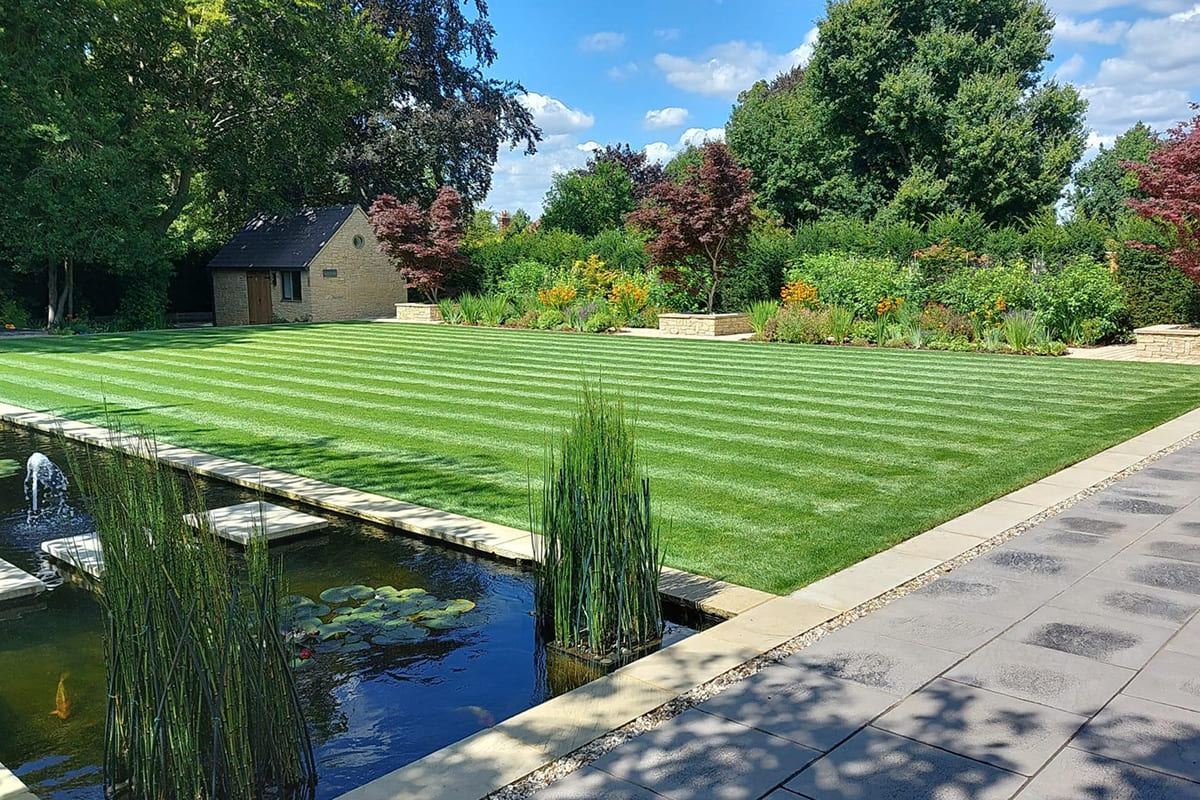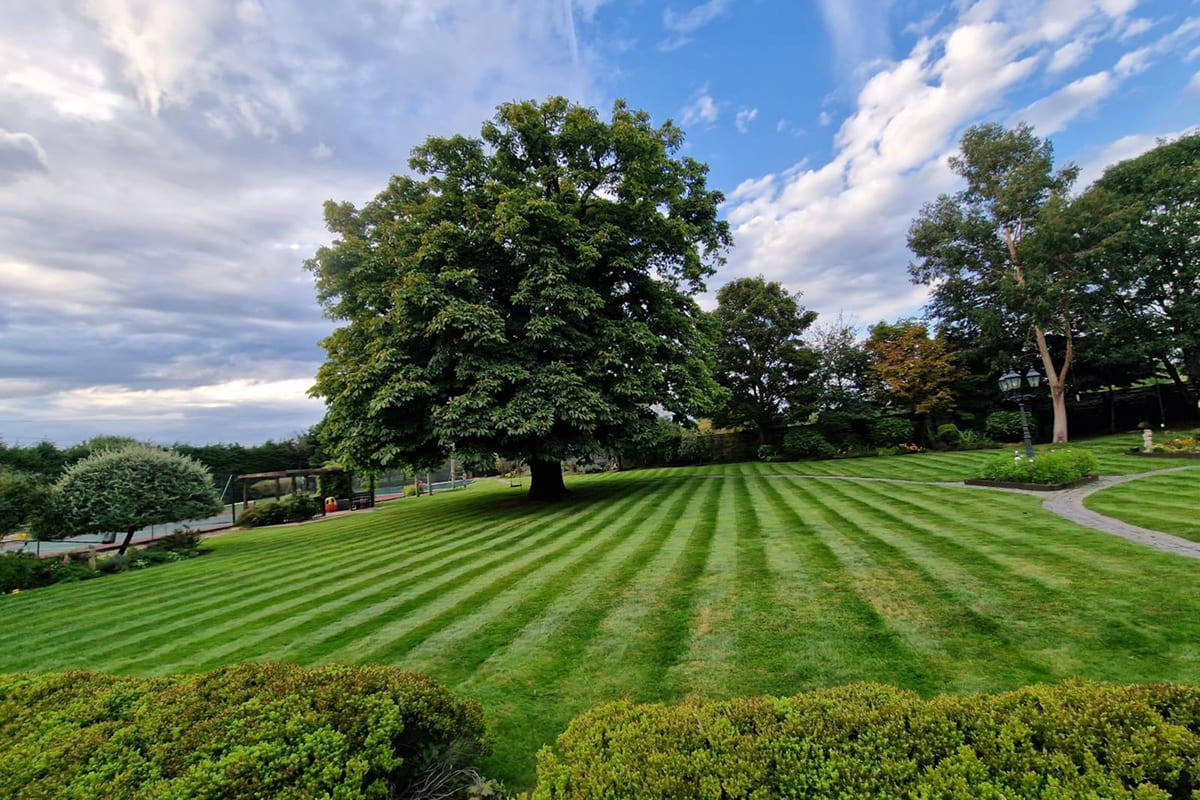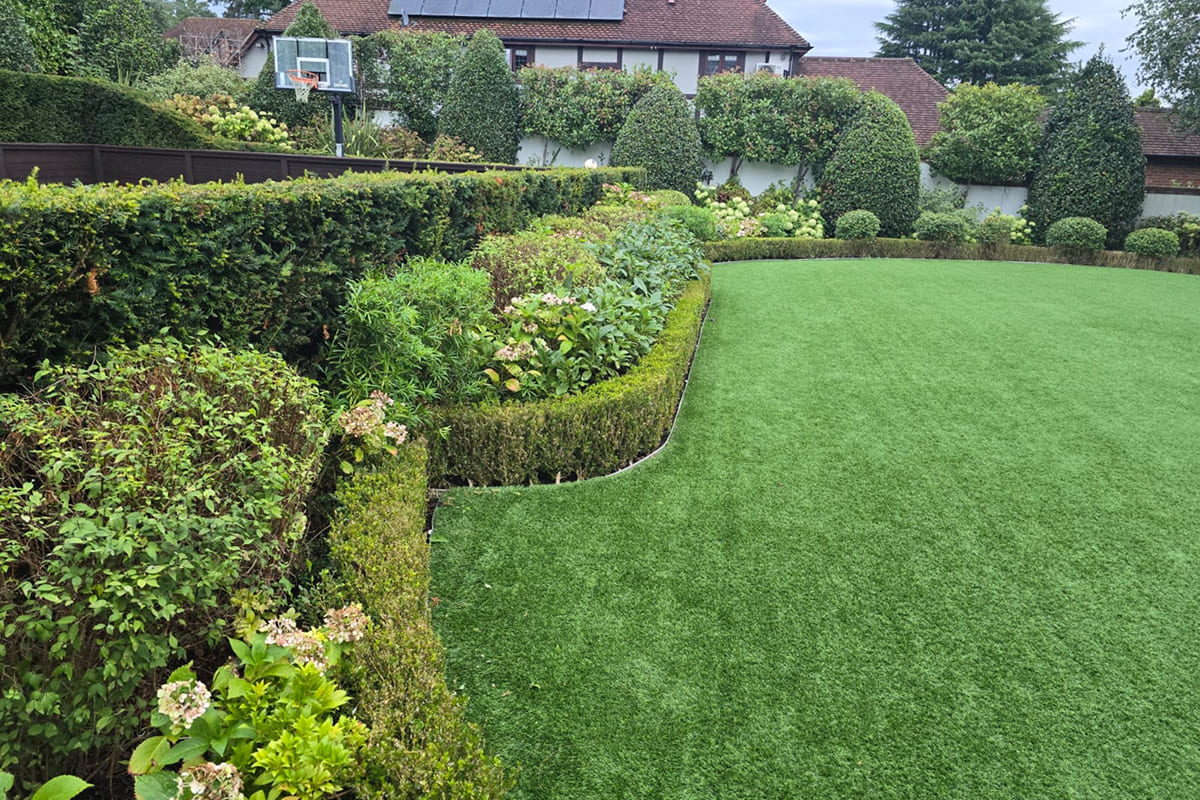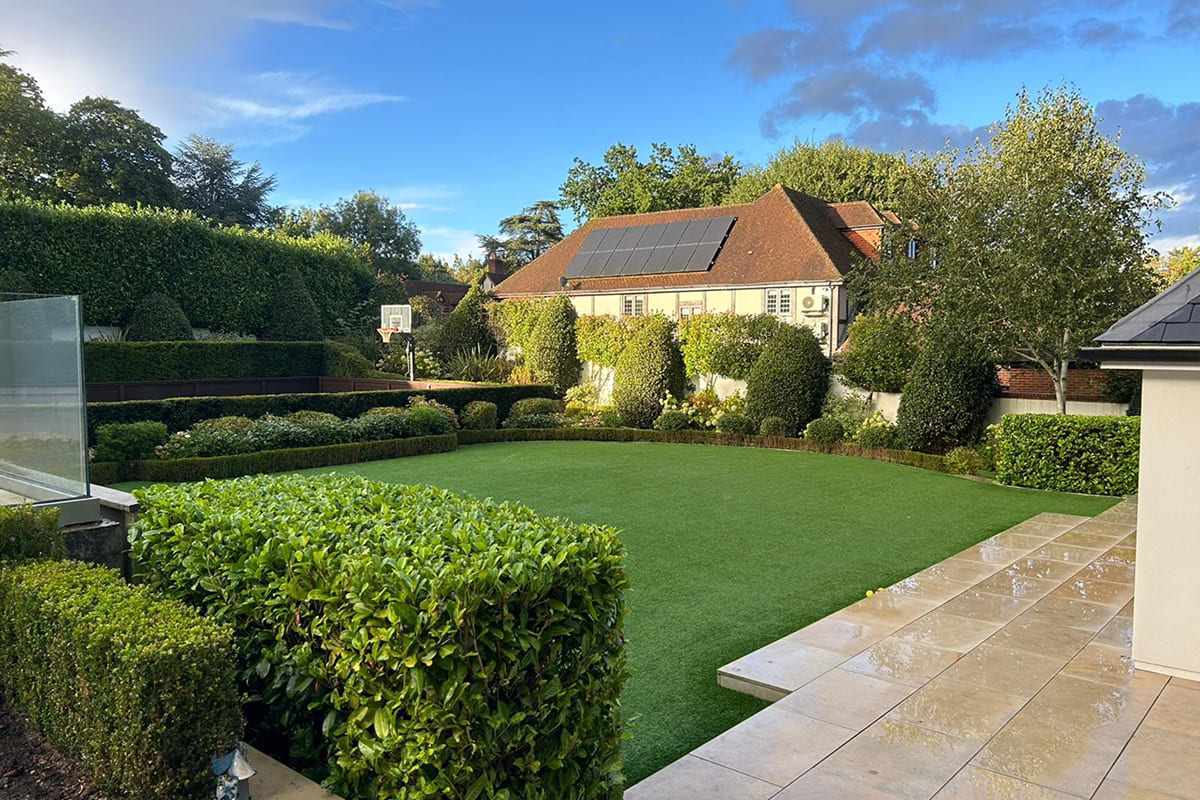Garden Maintenance
Why Garden Maintenance Makes All the Difference Year-Round
A thriving garden doesn’t happen by accident. Behind every stunning outdoor space lies consistent, thoughtful care that keeps plants healthy, lawns lush, and pathways pristine through every season. Garden maintenance ensures your outdoor space stays healthy, tidy, and enjoyable all year, transforming what could be a demanding chore into a source of pride and pleasure. Regular garden maintenance can also help attract tenants by enhancing the property’s appeal.
Many homeowners start with the best intentions, armed with enthusiasm and weekend plans to tackle their outdoor spaces. Yet as seasons change and life gets busy, gardens can quickly become overwhelming. Weeds creep in, lawns develop patchy areas, and once-beautiful borders lose their structure. This is where professional garden maintenance makes all the difference.
At Beautiful Spaces, we understand that your garden is more than just an outdoor area—it’s an extension of your home and a reflection of your lifestyle. Our comprehensive garden maintenance services are designed to keep your outdoor space looking its absolute best while giving you more time to simply enjoy it.
Whether you’re a busy professional who loves the idea of a beautiful garden but lacks the time to maintain it, or someone who wants expert guidance to help their outdoor space truly flourish, professional garden maintenance offers the perfect solution.

What Garden Maintenance Really Includes
Garden maintenance encompasses far more than the occasional mow or quick weed. It’s a comprehensive approach to outdoor care that addresses every aspect of your garden’s health and appearance. True garden maintenance involves regular, systematic care of plants, lawns, and outdoor features to ensure they remain vibrant and structurally sound. Garden design is also an important aspect, ensuring both functionality and aesthetics.
The core tasks include regular lawn mowing and edging to maintain clean lines and healthy grass growth. Weeding forms another crucial element, preventing unwanted plants from competing with your chosen varieties for nutrients and space. Pruning keeps shrubs and trees in shape while promoting healthy growth patterns and preventing disease.
All power tools, including lawnmowers, hedge trimmers, and other power tools, should be in good condition and regularly checked for safety. When using electrical gardening equipment, it is important to use RCD protection, such as a plug-in RCD, especially if there is no residual current device installed in the fuse box. This helps ensure safety when operating power tools in the garden.
Plant feeding and soil care ensure your garden receives the nutrients it needs to thrive. This includes applying appropriate fertilisers at the right times and monitoring soil health throughout the seasons. Seasonal planting and replanting keep your garden looking fresh and ensure continuous colour and interest.
Debris clearance might seem straightforward, but it’s essential for preventing pest harbourages and maintaining the overall appearance of your space. This includes leaf collection, dead-heading flowers, and removing any fallen branches or garden waste.
There’s a significant difference between one-off garden tidying and ongoing professional maintenance. While a single garden clear-up can certainly improve appearances temporarily, consistent maintenance prevents problems before they start. Regular visits allow gardening professionals to spot potential issues early, adjust care routines based on seasonal needs, and ensure your garden develops in a healthy, sustainable way.
Pre-Tenancy Preparation: Setting the Stage for Success
A well-prepared garden can make all the difference when it comes to attracting tenants and ensuring a smooth tenancy. For landlords, investing in a low-maintenance garden is a cost-effective way to reduce future upkeep and avoid common tenancy issues. Start by designing your outdoor space with drought-tolerant flowering shrubs, slow-growing plants, and perennials combined with hard landscaping. These choices not only look attractive year-round but also require less water and attention, making them ideal for busy tenants and reducing the risk of a neglected garden.
Providing good quality gardening equipment, such as a reliable lawn mower and hedge trimmer, is another smart move. Ensure all tools are in good condition and meet current health and safety standards, so tenants can easily maintain the garden without worry. Including clear instructions for use and storage—perhaps in a locked outbuilding—can help keep equipment safe and functional.
Most importantly, outline the tenant’s responsibilities in the tenancy agreement. Specify that the garden should be kept litter-free, reasonably tidy, and not overgrown. Clear guidelines help prevent misunderstandings and make it easier to resolve any issues that arise. By setting the stage with a well-designed, easy-to-maintain garden and clear expectations, landlords can attract great tenants and protect their investment from the start.

The Clear Benefits of Professional Garden Maintenance
Professional garden maintenance delivers advantages that extend far beyond simple aesthetics. When experts regularly care for your outdoor space, plants receive precisely the right attention at exactly the right time, leading to healthier growth, better disease resistance, and more vibrant displays throughout the year.
Your property’s kerb appeal significantly improves with consistent professional care. A well-maintained garden creates an excellent first impression, whether you’re welcoming guests or considering your home’s market value. Studies consistently show that quality landscaping and garden maintenance can increase property values by up to 15%, making it one of the most worthwhile investments you can make.
Prevention proves far more effective than cure when it comes to garden problems. Regular maintenance helps you manage potential issues before they escalate. Professional gardeners can identify potential issues early and take appropriate action before small problems become expensive disasters. This proactive approach ensures that problems are addressed before reaching a later stage, where they may become more difficult and costly to resolve.
The time and energy savings cannot be overstated. Garden maintenance requires not just physical effort but also extensive knowledge about plant care, seasonal timing, and proper techniques. By entrusting this work to professionals, you free up your weekends and evenings while ensuring the work is completed to the highest standards.
Professional maintenance also means access to specialist knowledge and equipment. Expert gardeners understand which plants thrive in specific conditions, how to achieve optimal results with fertilisers and treatments, and when to perform various maintenance tasks for maximum effectiveness.
Comprehensive Garden Maintenance and Lawn Mowing Services
Modern garden maintenance encompasses a wide range of services, each designed to address specific aspects of outdoor care. Understanding these services helps you appreciate the comprehensive approach required for truly successful garden maintenance.
Lawn Care and Edging
Lawn care forms the foundation of most garden maintenance programmes. This includes regular mowing at appropriate heights for different grass types and seasons, edge trimming for crisp, professional-looking boundaries, and seasonal treatments such as feeding, weed control, and moss prevention. Professional lawn care also includes aeration when needed and overseeding to maintain thick, healthy coverage.
Hedge Trimming and Pruning
Proper hedge trimming maintains not just appearance but also plant health. Different hedging plants require trimming at specific times of year, and the technique varies depending on whether you’re maintaining formal shapes or encouraging natural growth.
Pruning extends to shrubs and trees, promoting healthy growth patterns, removing diseased or damaged material, and maintaining appropriate sizes for your space. Professional maintenance also includes the care and management of large shrubs and climbing plants, which require specialised attention for safety and aesthetics.
Seasonal Planting and Displays
Seasonal planting keeps your garden interesting throughout the year. This might involve spring bulb displays, summer bedding plants, autumn colour schemes, and winter interest features. Professional gardeners can plan and implement seasonal rotations that ensure your garden always offers something beautiful to enjoy.
Hard Landscaping Care
Patios, decking, and pathways require regular attention to maintain their appearance and safety. This includes pressure washing to remove algae and stains, checking for and addressing loose materials, and ensuring proper drainage. Well-maintained hard landscaping features integrate seamlessly with planted areas and provide safe, attractive access through your garden.
Garden Waste Management
Proper waste removal and disposal form an essential part of garden maintenance. This includes not just clearing debris but also ensuring organic waste is disposed of responsibly, whether through composting programmes or appropriate waste collection services.

Time-Saving Strategies for Effortless Garden Care
Garden maintenance doesn’t have to be time-consuming or feel like too much effort. There are several strategies landlords and tenants can use to save time and keep the garden looking its best with minimal fuss. Start by designing a low-maintenance garden using drought-tolerant plants and perennials, which require less frequent watering and care. Adding mulch to flower beds and borders helps suppress weeds and retain soil moisture, reducing the need for constant weeding and watering.
Regular lawn mowing and hedge trimming are key to keeping the garden tidy and preventing small problems from becoming big ones. For those who prefer not to handle all the work themselves, hiring a gardener or providing tenants with a list of recommended gardening services can be a smart, cost-effective solution. Landlords should also offer practical advice on maintaining the garden, such as the importance of keeping the soil healthy and removing weeds before they spread.
By implementing these time-saving strategies, both landlords and tenants can enjoy a beautiful, well-maintained garden without it becoming a burden.
Why Beautiful Spaces Stands Out for Garden Maintenance
At Beautiful Spaces, we bring a unique combination of horticultural expertise, practical experience, and genuine passion for creating and maintaining beautiful outdoor spaces. Our approach to garden maintenance goes beyond basic tidying to encompass comprehensive care that helps your garden reach its full potential.
Our team possesses extensive horticultural knowledge, understanding not just how to maintain gardens but why specific approaches work best in different situations. This knowledge allows us to adapt our maintenance routines to your garden’s unique characteristics, ensuring optimal results regardless of your outdoor space’s size, style, or challenges.
Flexibility forms a cornerstone of our service approach. We recognise that different gardens have different needs, and different homeowners have different preferences and budgets. Our garden maintenance packages range from weekly visits during peak growing seasons to monthly check-ups and seasonal tidy-ups, allowing you to choose the level of support that works best for your situation.
Sustainable gardening practices guide our work wherever possible. This includes choosing environmentally friendly products, encouraging beneficial wildlife, promoting healthy soil through organic matter addition, and implementing water-efficient maintenance routines. We believe beautiful gardens should also be environmentally responsible gardens.
Reliability and attention to detail set us apart. When we commit to maintaining your garden, you can trust that we’ll arrive when promised and complete work to consistently high standards. Our meticulous approach means no detail is overlooked, from ensuring edges are perfectly trimmed to leaving your outdoor space tidy and ready for you to enjoy. Maintaining a beautiful garden can also help landlords attract and retain a great tenant, as well-kept outdoor spaces are highly valued by responsible renters.

Seasonal Garden Maintenance: Your Year-Round Guide
Understanding seasonal garden maintenance helps you appreciate the year-round nature of proper garden care. Each season brings specific tasks and opportunities, and professional maintenance ensures nothing important is missed. Seasonal growth requires adjusting maintenance routines to address changing plant needs as the year progresses.
Spring Garden Maintenance
Spring marks the beginning of the active growing season, making it crucial for setting up success throughout the year. Understanding how plants grow during this period helps determine the best times for planting and pruning. Key spring tasks include soil preparation and improvement, often through adding organic matter and checking pH levels. This is prime time for planting new additions to your garden, whether trees, shrubs, perennials, or seasonal displays.
Fertilising becomes important as plants begin active growth, requiring nutrients to support healthy development. Pruning of certain plants—particularly summer-flowering shrubs—should be completed before new growth becomes too advanced. Spring also offers the ideal opportunity for lawn renovation, including overseeding bare patches and beginning regular feeding programmes.
Summer Garden Maintenance
Summer maintenance focuses heavily on supporting plants through the active growing season. Learning how to properly water plants is essential to support healthy growth during hot weather. Watering becomes crucial, not just in terms of frequency but also technique—deep, less frequent watering encourages stronger root development than daily light watering.
Deadheading flowers encourages continued blooming throughout the season and prevents plants from putting energy into seed production when you want continued flower displays. Lawn care intensifies during summer, with regular mowing, edge trimming, and monitoring for pest or disease issues.
Summer also provides excellent opportunities for enjoying your garden, making it important to maintain seating areas, pathways, and other features that enhance your outdoor experience.
Autumn Garden Maintenance
Autumn garden maintenance prepares your outdoor space for winter while setting the stage for next year’s success. Leaf clearance becomes a major focus, not just for appearance but also to prevent lawn damage and reduce pest harbourages.
This season offers ideal conditions for planting trees and shrubs, as soil remains warm while air temperatures cool, encouraging root development without stressing top growth. Bulb planting for spring displays must be completed during the autumn months.
Mulching around plants helps protect roots through winter while improving soil as organic matter breaks down. Many plants benefit from autumn pruning, particularly those that might bleed sap if cut during active growth periods.
Winter Garden Maintenance
Winter maintenance might seem minimal, but several important tasks ensure your garden emerges strong in spring. Protecting tender plants from frost damage preserves your investment and prevents the need for replacement plantings.
Winter offers ideal opportunities for major pruning of deciduous trees and shrubs, as bare branches make it easier to assess structure and make appropriate cuts.
Planning for the coming year—whether new plantings, layout changes, or maintenance schedule adjustments—ensures you’re ready when spring growing conditions return.
Garden structure maintenance, including checking and repairing fences, gates, and other features, is best completed during winter when plants are dormant and access is easier.
Garden Maintenance and Property Value: Maximising Your Investment
Regular garden maintenance is one of the most effective ways to maximise the value of your rental property. A well-maintained garden not only enhances kerb appeal but also makes the property more attractive to potential tenants, helping to reduce vacancy periods and command higher rents. In contrast, a neglected garden can quickly become a common cause of tenancy issues, lower the property’s value, and lead to costly repairs or replacements.
Landlords should ensure tenants understand the importance of keeping the garden in good condition and provide them with the necessary gardening equipment to make maintenance easy. Simple tasks like regular weeding, pruning, and lawn care can prevent problems before they start and keep the garden looking its best. By investing in regular maintenance and clear communication, landlords can protect their investment, maintain the property’s value, and create a welcoming outdoor space that tenants are proud to call their own.
Transform Your Garden with Beautiful Spaces
Garden maintenance represents one of the most rewarding investments you can make in your property and lifestyle. The difference between a neglected outdoor space and a professionally maintained garden extends far beyond mere appearance—it encompasses plant health, property value, environmental responsibility, and your own enjoyment of your outdoor space.
With professional garden maintenance from Beautiful Spaces, your garden will thrive in every season, providing year-round beauty and satisfaction while freeing you to focus on the aspects of gardening you most enjoy. Whether that’s relaxing with morning coffee surrounded by beautiful plants, entertaining friends in a perfectly maintained space, or simply knowing your outdoor area always looks its best, our comprehensive maintenance services make it all possible.
Our team is ready to discuss how we can tailor our garden maintenance services to your specific needs, preferences, and budget. From weekly visits during peak seasons to monthly check-ups and seasonal preparations, we’ll create a maintenance plan that keeps your garden looking stunning while fitting seamlessly into your lifestyle. To ensure transparency and client satisfaction, Beautiful Spaces documents the exact work carried out during each visit.
Contact Beautiful Spaces today to discover how professional garden maintenance can transform your outdoor space into the beautiful, thriving garden you’ve always wanted. Let us handle the expertise and hard work while you enjoy the results.
Frequently Asked Questions about Garden Maintenance
How often should garden maintenance be carried out?
The frequency of garden maintenance depends on several factors, including your garden’s size, complexity, and the level of perfection you’re seeking. Most gardens benefit from fortnightly visits during the main growing season (April through September), with monthly visits often sufficient during autumn and winter. Gardens with extensive lawns, formal hedging, or high-maintenance features may require weekly attention during peak growing periods.
Do you offer one-off garden tidy-ups as well as regular maintenance?
Absolutely. Beautiful Spaces provides both ongoing maintenance programmes and one-off garden tidy-ups for various situations. Whether you’re preparing for a special event, addressing seasonal changes, tackling an overgrown garden, or simply want a fresh start before beginning regular maintenance, our team can help. One-off services often serve as an excellent introduction to our work quality and approach.
Can you help make my garden more low-maintenance?
Certainly! We can suggest plants, layouts, and materials that significantly reduce ongoing maintenance requirements without sacrificing beauty or interest. This might involve recommending drought-tolerant plants, installing automatic irrigation systems, creating structured planting schemes that suppress weeds naturally, or incorporating hard landscaping features that provide impact with minimal upkeep. Low-maintenance doesn’t mean low-quality or boring—it means smart design and plant choices.
What are the responsibilities for garden maintenance in a rental property?
In rental properties, the tenant’s responsibilities and the landlord’s obligations regarding garden maintenance should be clearly outlined in tenancy agreements. The tenant is usually responsible for routine upkeep such as mowing, weeding, and general tidiness, while the landlord may be responsible for major tree work or structural repairs. Clearly defining the tenant’s responsibility and the landlord’s role in the tenancy agreement helps prevent disputes and ensures both parties understand their duties.
What should happen at the end of a tenancy regarding the garden?
At the end of a tenancy, the tenant is typically required to return the garden to its original condition or original state as recorded at the start of the tenancy. Check in reports and check out reports are essential for both the landlord and tenant to verify that the garden is in the same condition as when the tenancy began. These reports serve as key evidence for resolving any disputes over property condition or damages.
How are costs for garden repairs or restoration handled?
When garden repairs or restoration are needed, it is important for both the landlord and tenant to provide clear documentation and invoices detail for any work carried out. This helps with negotiating costs and resolving disputes fairly, ensuring that all expenses are transparent and agreed upon by both parties.
What happens to garden waste during maintenance visits?
All garden waste generated during our maintenance visits is removed from your property and disposed of responsibly. We’re committed to environmental sustainability, so organic waste goes to appropriate composting facilities whenever possible, while other materials are recycled or disposed of according to local environmental guidelines.
You’ll never need to worry about what to do with the clippings, leaves, or other debris from your garden maintenance.